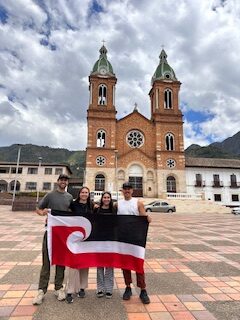
Written By Manasseh Cowley

We had just finished presenting at one of Bogotá’s most prestigious universities and it was now time for whakawhanaungatanga and kai. Seated to my left was a professor of law. Although not Indigenous herself, she shared her hopes for a future that saw the integration of Colombia’s Indigenous legal systems and its current mainstream one. I smiled and noddingly said “well, the future is Indigenous”. As if by reflex she half laughingly corrected me saying, “the future is for everyone”.
Her discomfort with what I said surprised me. The irony in her reaction was that neither of our statements stood at odds with one another. A future that is Indigenous is a future for everyone. It is this misunderstanding that breeds fear, protects fragility over truth, keeps the oppressed subdued and, what I’d like to argue, keeps the coloniser hidden. You see, I’m sure if I had said “the future is decolonial” she wouldn’t have batted an eye. Decolonisation is about being anti-colonial, so yeah. That’s easy. And agreeable – packaged in obvious and abrasive wrapping that screams BAD. But it’s a phrase that offers shelter to the unassuming coloniser because it doesn’t actually call on them to change. It doesn’t change their world nor does it change how they see it – they’re already anti-colonisers. Or so they think.
Today’s colonisers aren’t sailing seas, wielding muskets and fictional legal documents (actually, I concede with the latter). Instead, they are common-folk who, whether knowingly or not, complacently benefit from a system built upon the oppression of indigenous peoples. They throw around weightless slogan slop like “all are equal”, “all lives matter”, “the future is for everyone” (etc. we’ve heard it all before). These slogans are soothing to the colonial ear because they can easily see themselves included in them.
Although at their core, decolonisation and reindigenisation are the same, the point of difference is that decolonisation is centred on the coloniser. This can be helpful in explicitly calling out the colonial structures that need to be dismantled. On the flip side, it measures our journey of reclaiming our māoritanga with the coloniser as a point of reference. Our focus and guiding pou should be on our tūpuna, our reo, and our tikanga, not on the oppressor of those taonga. True decolonising is not about creating space between us and the coloniser, but in removing the coloniser all together. Our mana is home-grown. It is within our social structures of whānau, hapū and iwi that mana motuhake lies, and relying on the Crown and its systems to get our mana motuhake back is fatal.
My journey of reindigenisation began with my enrollment to Te Tohu Paetahi. My first day in class was a spiritual experience. I felt a closeness to my tūpuna that I had never felt before and I know that such a closeness was felt because in that classroom, there was no room for the coloniser. It was just me, te reo māori me ōna tikanga, and through them, my tūpuna.
So, why the discomfort? Why the knee-jerk reaction from that professor in Colombia?
Because in the frame of “reindigenisation”, the inconspicuous coloniser sees no place of refuge, and instead assumes the defensive. In their minds, to be pro-māori somehow translates to being anti-them. And if to be pro-māori means to be anti-coloniser, what else needs to be said.
“Decolonisation” on the other hand is an obvious confrontation with the coloniser, and because today’s colonisers come in a different form than those of the past, all it takes is a disingenuous nod and they are able to remain hidden, complicit beneficiaries.
Disclaimer: Hot take from a law student that enjoys playing devil’s advocate. The views expressed are reflective of the points one who is arguing for the sake of arguing would hold.